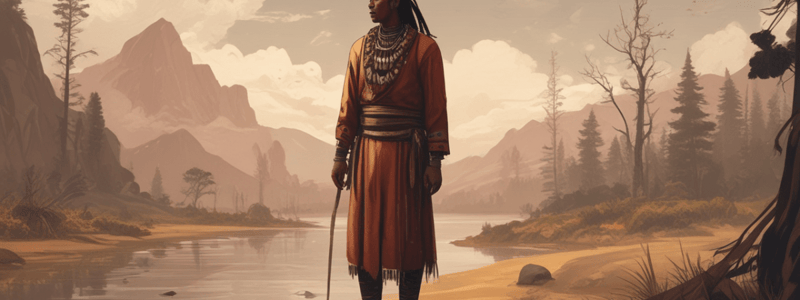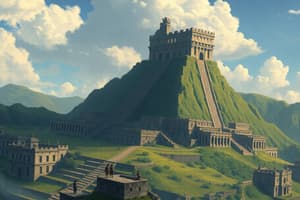Podcast
Questions and Answers
In the documentary Canoe Journey, what is the significance of the 30th anniversary of the canoe journeys?
In the documentary Canoe Journey, what is the significance of the 30th anniversary of the canoe journeys?
- It marked the beginning of the salmon spawning season
- It marked a significant milestone in preserving Salish culture (correct)
- It marked the beginning of colonization
- It saw the end of canoe journeys
In the documentary Canoe Journey, what is the stated primary goal of canoe journeys in terms of cultural preservation?
In the documentary Canoe Journey, what is the stated primary goal of canoe journeys in terms of cultural preservation?
- To create new cultural practices
- To blends their culture with that of the newcomers
- To pass down their cultural heritage to future generations (correct)
- To forget their cultural heritage
Flashcards are hidden until you start studying
Study Notes
Indigenous People's Connection to the Land and Water
- Indigenous people have lived along the coast and waterways for centuries, relying on salmon for survival.
- Salmon are crucial to their livelihood, and they prepared themselves to harvest salmon in the most plentiful places.
The Impact of Colonization
- The arrival of newcomers dramatically changed the indigenous way of life.
- Borders were imposed, restricting their movement and access to their traditional lands.
- Assimilation policies took away their culture, moving them to reservations.
Revival of Canoe Journeys
- The last great canoe journey occurred in 1855, when tribes went to Mukilteo to sign a treaty with the newcomers.
- Today, canoe journeys are being reborn, allowing indigenous people to reconnect with their culture and ancestors.
- These journeys involve traveling by canoe, singing, and practicing traditional ceremonies.
Identity and Rebirth
- Many indigenous youth are seeking their identity and wanting to be part of these canoe journeys.
- Elders participate to witness the rebirth of their culture and stand proud with their ancestors.
- The journeys bring healing, not just for individuals, but also for their communities and ancestors.
Unity and Celebration
- Canoe journeys bring together people from different tribes, celebrating their shared culture and heritage.
- The 30th anniversary of the canoe journeys saw over 100 canoes gather, marking a significant milestone in preserving their culture.
- The unity and pride among the participants are palpable, showcasing their resilience and determination to keep their traditions alive.
Preservation of Culture and Language
- Canoe journeys help preserve the language, culture, and traditions of indigenous people.
- The songs, dances, and ceremonies practiced during these journeys ensure their cultural heritage is passed down to future generations.
- The journeys also promote unity, understanding, and goodwill among the participating tribes and nations.
Sharing Culture and Traditions
- The canoe journeys provide an opportunity for indigenous people to share their culture, traditions, and songs with others.
- They demonstrate the importance of giving, sharing, and respecting one another's ways of life.
- The journeys foster a sense of community, mutual respect, and understanding among participating nations and tribes.
Indigenous People's Connection to the Land and Water
- Indigenous people have lived along the coast and waterways for centuries, relying on salmon for survival and harvesting them in the most plentiful places.
- Salmon are crucial to their livelihood.
The Impact of Colonization
- The arrival of newcomers led to the imposition of borders, restricting indigenous people's movement and access to their traditional lands.
- Assimilation policies took away their culture, moving them to reservations.
Revival of Canoe Journeys
- The last great canoe journey occurred in 1855, when tribes went to Mukilteo to sign a treaty with the newcomers.
- Today, canoe journeys are being reborn, allowing indigenous people to reconnect with their culture and ancestors.
- These journeys involve traveling by canoe, singing, and practicing traditional ceremonies.
Identity and Rebirth
- Many indigenous youth are seeking their identity and wanting to be part of these canoe journeys.
- Elders participate to witness the rebirth of their culture and stand proud with their ancestors.
- The journeys bring healing, not just for individuals, but also for their communities and ancestors.
Unity and Celebration
- Canoe journeys bring together people from different tribes, celebrating their shared culture and heritage.
- The 30th anniversary of the canoe journeys saw over 100 canoes gather, marking a significant milestone in preserving their culture.
Preservation of Culture and Language
- Canoe journeys help preserve the language, culture, and traditions of indigenous people.
- The songs, dances, and ceremonies practiced during these journeys ensure their cultural heritage is passed down to future generations.
- The journeys also promote unity, understanding, and goodwill among the participating tribes and nations.
Sharing Culture and Traditions
- The canoe journeys provide an opportunity for indigenous people to share their culture, traditions, and songs with others.
- They demonstrate the importance of giving, sharing, and respecting one another's ways of life.
- The journeys foster a sense of community, mutual respect, and understanding among participating nations and tribes.
Studying That Suits You
Use AI to generate personalized quizzes and flashcards to suit your learning preferences.




